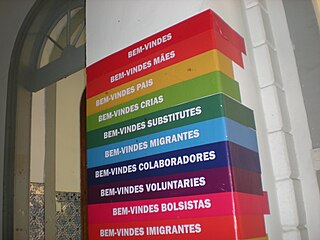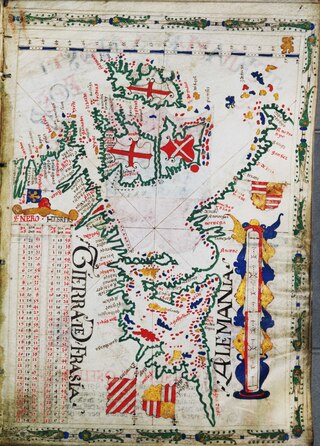
Demographic features of the population of Portugal include population density, ethnicity, education level, health of the populace, economic status, religious affiliations and other aspects of the population.

The Portuguese people are a Romance-speaking ethnic group and nation indigenous to Portugal, a country in the west of the Iberian Peninsula in the south-west of Europe, who share a common culture, ancestry and language.
Portuguese Luxembourgers are the citizens or residents of Luxembourg whose ethnic origins lie in Portugal.
Portuguese Venezuelans are Portuguese-born citizens with Venezuelan citizenship or Venezuelan-born citizens of Portuguese ancestry or citizenship. Mostly located in Caracas, Valencia and Maracaibo, also Barquisimeto, the Portuguese community of Venezuela are among the largest ethnic groups in the country. The State of Portuguesa takes its name from the Portuguesa River, in which a Portuguese women is said to have drowned.
Portuguese in the Netherlands are the citizens or residents of the Netherlands whose ethnic origins lie in Portugal.
Portuguese in France (Luso-French) refers to people from Portugal who immigrated to or reside in France or French citizens of Portuguese descent.
Uruguayans in France are people born in Uruguay who emigrated to France.
Portuguese in Sweden are citizens and residents of Sweden who are of Portuguese descent.

Gender-neutral language in Portuguese is a recent strand of demands for greater gender equality and social inclusion between men, women and non-binary individuals. It can be divided into inclusive or non-sexist language, and non-binary or neuter language or neolanguage. Inclusive language aims to use existing words to include all genders, while neuter language uses new or modified words to accomplish this.
Portuguese in Belgium are the citizens or residents of Belgium whose ethnic origins lie in Portugal.
Portuguese in Denmark are citizens and residents of Denmark and its dependencies who are of Portuguese descent.
Portuguese in Finland are citizens and residents of Finland who are of Portuguese descent.

Portuguese in Iceland are citizens and residents of Iceland who are of Portuguese descent.

Portuguese in Norway are citizens and residents of Norway and its external territories who are of Portuguese descent.

Portuguese in Estonia are citizens and residents of Estonia who are of Portuguese descent.

Portuguese in Latvia are citizens and residents of Latvia who are of Portuguese descent.
Portuguese in Lithuania are citizens and residents of Lithuania who are of Portuguese descent.

Portuguese in Croatia are citizens and residents of Croatia who are of Portuguese descent.

Portuguese in Slovenia are citizens and residents of Slovenia who are of Portuguese descent.
Portuguese in Germany are citizens and residents of Germany who are of Portuguese descent.










